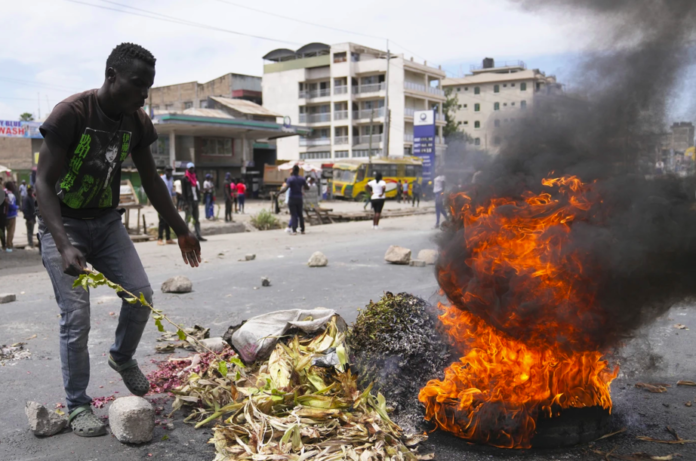By Winnie Kamau
Nairobi, Kenya: As Kenya has entered its 3rd week of Countrywide Protests which are mobilized online against the anti-finance Bill and high taxes under the prominent hashtag #RejectFinanceBill2024. The protests have morphed into demanding Good Governance and calling for the resignation of the President in the country.
Internet Lobby Groups are demanding to know who ordered the recent Internet Shutdown that was experienced in Kenya during the 25th June countrywide protests and calling out on Telecommunication organizations and Internet Service Providers (ISPs).
The Protests that were organized through various social media and digital platforms as claimed by the Generation Z (Gen Zs) who make up half almost half of the population in Kenya. A proof of the power of a digitally empowered youth.
During the demonstrations on 25th June as shown by Net Blocks which is an Internet’s Observatory organization that tracks cybersecurity and digital governance confirmed indeed there was Internet shutdown in Kenya.
In a visualization of the internet disruption that occurred in Kenya during anti Finance Bill protests that revealed both domestic and downstream impacts on other countries. This is according to a recent report released by Net Blocks.
The findings from Net Blocks confirmed there was internet outage experience in Kenya and they also confirmed that there was no physical damage to the Subsea Cables contrary to the report by Safaricom CEO Peter Ndegwa.
Customer Notice On Network Outage pic.twitter.com/zgTlsawTPY
— Safaricom PLC (@SafaricomPLC) June 25, 2024
According to the Internet Lobby, groups noted that Kenyan telecommunication companies Safaricom and Airtel attributed these disruptions to “outages on undersea cables.” Despite the widespread disruption, no physical damage to subsea cables has been identified thus far. This indicates that the interruption may have been caused by other factors, such as routing issues or intentional disconnections.
— Airtel Kenya (@AIRTEL_KE) June 25, 2024
The impact on Kenya was more significant than in previous cable cuts. This is because Kenya is a major internet hub for the East African region, and the disruption affected both domestic and international connectivity. Many businesses and individuals were unable to access the internet, leading to disruptions in communication, commerce, and everyday activities.
MTN Uganda, a major telecommunications provider in the region, attributed the outage in Uganda to the disruptions in Kenya. This indicates that the impact of the disruption extended beyond Kenya’s borders, affecting other countries that rely on its infrastructure.
Kictanet, one of the internet’s Lobby Group, have questioned and are asking the Service Providers Safaricom, Airtel, and other ISPs “Clarify who gave the orders for the shutdown and whether there was any official documentation or directive from the government or regulatory bodies” asked Kictanet.
The internet disruption in Kenya also had downstream impacts on other countries in the region. For example, Tanzania experienced significant internet slowdowns, and Rwanda reported disruptions to mobile money services. These impacts highlight the interconnectedness of the internet and the potential for disruptions in one country to have cascading effects on others.
According to Cloud Flare’s report on X “Despite a promise not to shut down the #Internet, it appears connectivity in #Kenya has been disrupted in the wake of a crackdown on #RejectFinanceBill2024 protesters. Traffic dropped at ~13:30 UTC (16:30 local) in #Kenya, with #Uganda and #Burundi apparently impacted as well” observed the CloudFare Radar a Network that observes Internet Trends Globally.
Despite a promise not to shut down the #Internet, it appears connectivity in #Kenya has been disrupted in the wake of a crackdown on #RejectFinanceBill2024 protestors. Traffic dropped at ~13:30 UTC (16:30 local) in #Kenya, with #Uganda and #Burundi apparently impacted as well. pic.twitter.com/dfQrupipwq
— Cloudflare Radar (@CloudflareRadar) June 25, 2024
Another concern was observed by a Global Internet Service Provider, Liquid Intelligent Technologies Group CTIO Ben Roberts posted on X noting the same “Internet in Kenya (and East Africa) returning to normal levels after disturbances today. Data courtesy of @DougMadory” he wrote on X.
Internet in Kenya (and East Africa) returning to normal levels after disturbances today. Data courtesy of @DougMadory pic.twitter.com/7lN3zXjNNJ
— Ben Roberts
(@benliquidkenya) June 25, 2024
The exact cause of the internet disruption in Kenya is still under investigation. However, potential causes include routing issues, technical failures, or intentional actions. Telecommunications companies and government agencies are working to determine the root cause of the disruption and restore connectivity as soon as possible.
The internet disruption in Kenya serves as a reminder of the critical importance of internet connectivity in today’s world. The internet has become an essential tool for communication, education, commerce, and many other aspects of modern life. Disruptions to internet access can have significant consequences for individuals, businesses, and entire countries.

Another Internet Lobby Group KenSafeSpace in their statement are demanding that the Kenyan government cease and desist from interfering with internet access as it has a significant and adverse impact on citizens’ rights including access to mobile money services, healthcare, and other emergency services.
They also have called on the Communications Authority of Kenya, telecommunications companies, and Internet Service Providers, to restore internet and social media access, publicly explain the root cause of the internet disruption, commit to refrain from any form of Internet disruption in the future, and to respect human rights.















